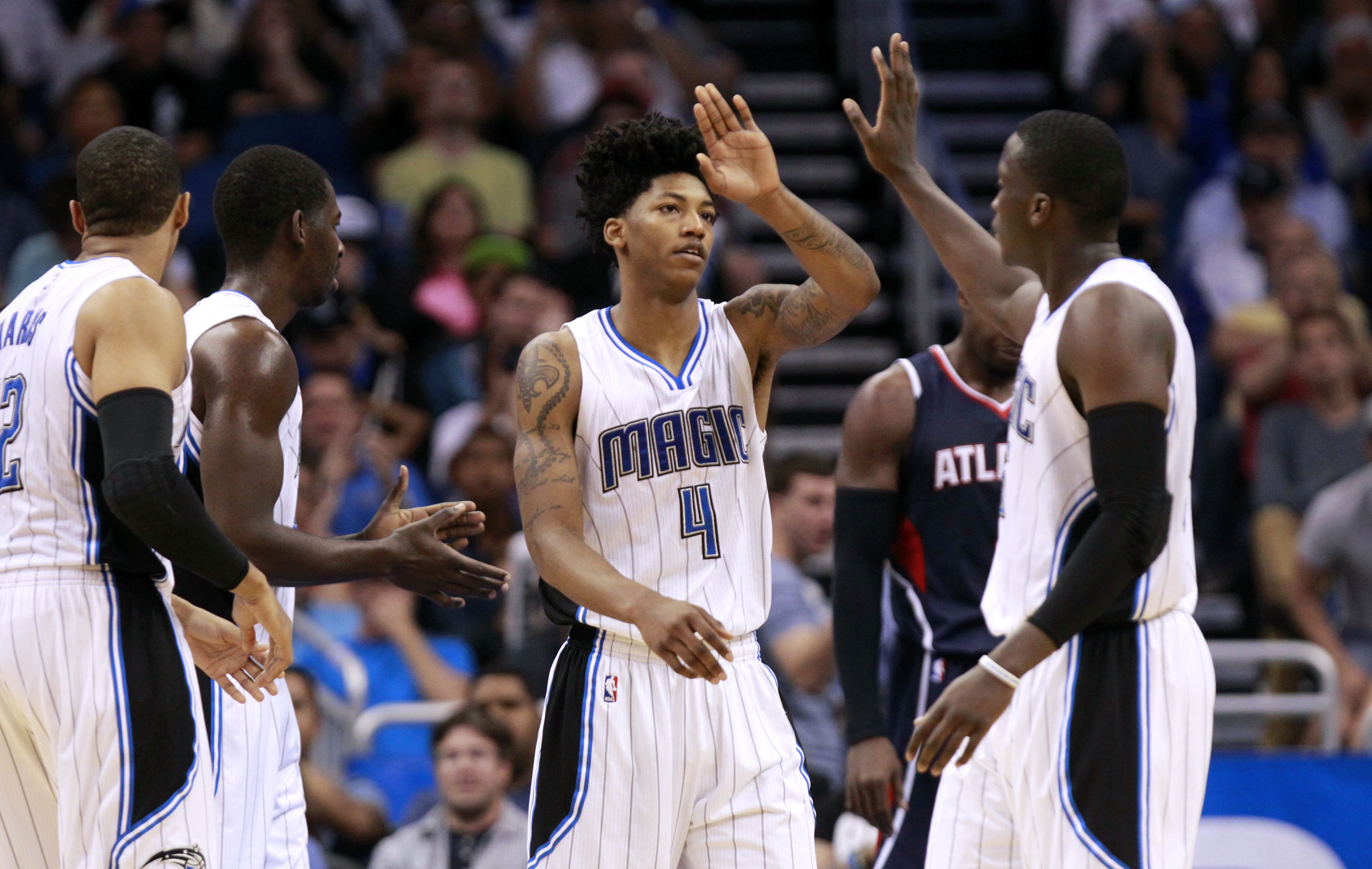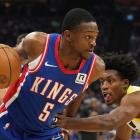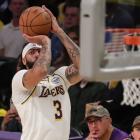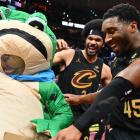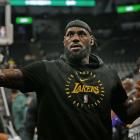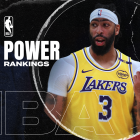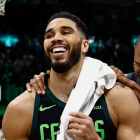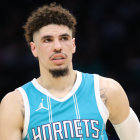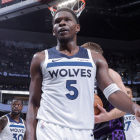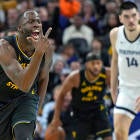If NBA rebuilds were easy, everyone would execute them in the same manner and we wouldn't have teams like the Kings (who have been bad for a decade) or the Clippers before Blake Griffin. Instead, it's a tricky process, fraught with perils of sliding into long-term mediocrity and dependent on exceptional luck in not only landing a high pick, but landing it at a spot where a great player is available, then landing that player and then doing that in consecutive drafts.
A traditional "rebuild" is pretty formulaic. There are teams that attempt to go different routes, but in general, the flow is the same. Starting at 12 o'clock, the graphic below pretty much sums up the process.
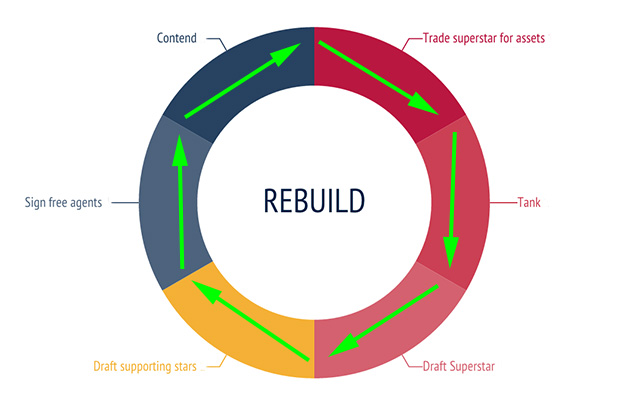
Basically, you trade your best player, and proceed to be awful for a season. Then, with your fancy new draft pick courtesy of that miserable season, you draft, hopefully, a star player around which your franchise can be built. At this point you're still awful, but at least you're promising with young talent. From here, you draft supporting talent, develop that talent, add some veteran free agents, and if your lucky, you're on your way to truly competing. Ideally, this provides a balance between being patient and not rushing steps, and also not languishing for too long in the dregs, risking damage to culture and wasted seasons for players, fans and everyone else.
The curve of that path, however, varies wildy from team to team, and is impacted by many factors. It does seem, however, that there's a certain model based on the above progression that has to be followed. Try to skip steps and a team can wind up mortgaging future assets, namely draft picks, or signing subpar veteran free agents too early in the process (say hey, Joe Dumars!), costing them the minutes they need for the youngsters. It's rare that a team can be "too" patient with a rebuild, but we're definitely seeing some signs of that with the Philadelphia 76ers, who genuinely seem to have no intention, once again, to take any sort of step forward this season.
"IT TAKES AS LONG AS IT TAKES"
I've written at nauseum about the Sixers before, but here is the core of what's important for this discussion: The Sixers aren't continually terrible on purpose; they're obnoxiously patient because they are determined, come hell or high water, to start the rebuild off right. Consider this from Liberty Ballers and Sam Hinkie after the trade of Michael Carter-Williams last season:
Make no mistake about it, chasing that superstar, or possibly superstars, is what this stage of the Sixers rebuild is about. This trade can be boiled down in a relatively simple way: the Sixers likely feel that the Lakers future draft pick has a better chance of putting them in a position to get a superstar than holding on to Michael Carter-Williams would have, whether that be a result of drafting and developing a player with that draft pick or using that pick in a trade.
"We're focused on 'How do you put the building blocks in place that have a chance to compete in May?' Those teams win in the high-50's," Hinkie said. "They get there usually on the backs of great players. As much as I've talked about how we make decisions, as much as I've talked about our organizational goals, and our player development, it is a players driven league. Still.
"When we have a set of players that can carry us deep [we will focus on winning] . That's the only way. That's the only way to get to where we're going," Hinkie continued.
Source: Sam Hinkie, Brett Brown, And Their Search For Superstars - Liberty Ballers.
The Sixers' rebuild path was a bit strange. They traded Andre Iguodala in 2012, but that was to acquire Andrew Bynum, who was supposed to take a then-mid-tier team to the next level. Instead, that flamed out, and when Sam Hinkie came in, he jettisoned talent to get assets. He started with Jrue Holiday, trading the often-injured-but-still-very-good point guard for two first-round picks, which he then turned into more picks like they were loaves of bread and he was Assets Jesus.
The asset collection continues to this day. This week, the Sixers traded Jason Thompson, who was legitimately excited to play for the team near where he grew up. They didn't move Thompson for a first-rounder, but rather the right to swap picks with the Warriors in the unlikely event that the Oklahoma City Thunder, or even more unlikely, the Miami Heat, finish above the 67-win defending champs. Basically, the Sixers moved Thompson for the slim possibility of moving up maybe a handful of spots at the absolute best. The crazy part is, based on their plan, you really can't blame them. Moving up like that does more for their plan than keeping Thompson.
The Sixers have always opted for upside. It's why they traded MCW before we really knew what kind of player he was. It's why they took Jahlil Okafor before knowing Joel Embiid would miss the upcoming season despite already having Nerlens Noel. It's why they took both Embiid and Dario Saric in the pivotal 2014 draft, despite knowing Saric wouldn't come over from Europe for several seasons. They have tried to stockpile as many picks as possible to give them the best chance of getting that foundational player. Noel isn't that guy. He's very good, maybe even on his way to being great; the rookie had a phenomenal year last season and projects as a plus-Marcus Camby, which is a great ceiling. If he were the foundational player, however, the team would have started moving forward. They clearly don't think he is.
So the Sixers are slow rolling this thing. I've argued for building a core of young players and then pursuing that star player in future drafts, because I don't believe taking Aaron Gordon or Dante Exum in 2014 would have improved them enough so as to hinder their chances of getting Jahlil Okafor or D'Angelo Russell in 2015.
Either way, the Sixers continue to choose losing as at least a theoretical path to winning, and there are are real concerns attached to long-term losing, which traditionalists have lodged. For one, it instills a culture of, you know, losing, and that does have an effect on guys. You don't have to be around the league long to see the impact losing has on players long-term. Some become frustrated and angry, others become apathetic and removed.
The Sixers are fortunate to have enough young players that are focused on process over results, but this is largely because many of their players are simply happy to have an NBA career, let alone an actual successful one. Most players who can help you win, they want to win, so you have to cross the bridge from rebuiding to competing at some point.
Of course, there are dangers that come with pressing that process.
And with that, let's turn our attention to the Boston Celtics.
DANNY AINGE AND THE CHAMBER OF SECRET FIRST-ROUNDERS
Celtics GM Danny Ainge held onto that ghost for a long time. Well past the point where it was clear the window had closed for those Celtics, Ainge held onto the idea of sucking the marrow from the greatness of the team that had brought the title back to Boston in 2008. He held onto Kevin Garnett and Paul Pierce beyond when their trade value should have peaked, but fortunately for Ainge, Billy King has got Mikhail Prokhorov's dice to roll. He held onto Rajon Rondo for just a bit too long. And still, despite this, he managed to get an absolutely stuffed cupboard of picks and young pieces, so did he really wait too long?
Ainge has a roster full of movable contracts for good-but-tradeable players, and six future first-round picks. Boston made the playoffs last year and ended on an absolute tear. The future should be blisteringly bright.
Here's the problem, in two parts. First, riddle me this: Who is the Celtics' best player? Who are the Celtics' best three players? Isaiah Thomas? Marcus Smart? Avery Bradley? Amir Johnson? Jae Crowder? Evan Turner? I have spent an unhealthy amount of time trying to answer those questions this summer. You can't really move forward with a rebuild without that guy. You can make the argument for Thomas, but there are specific matchups (big backcourts) in which he's a liability defensively and he remains a sixth man. Even if you don't think starting is important, it's hard to say a guy is unequivocably your best player if he's not one of your first five.
Second, the Celtics are proof that good assets don't always become gold. Ainge sent one pick to Phoenix in the Isaiah Thomas trade. That's pretty good value ... unless you start to consider that Thomas is just good enough to hinder their rebuilding efforts while not being good enough to make them a top-four seed in the East. The Celtics had two first-round picks in this past draft, Nos. 16 and 28, which they used on R.J. Hunter and Terry Rozier, respectively. I've made no secret about my disagreement with these picks. Rozier, who shined in Summer League, and Hunter might both end up being good NBA players. But nobody else was exactly clamoring for them. Boston probably could've gotten better value at those spots and still had a chance at either player later in the draft.
Big picture, if you look at the amount of assets Ainge had on January 1st, and you look at the roster itself on July 30th, your head tilts a little bit. The Celtics' rebuild isn't going badly by any means. They have a playoff team with good players, tradeable assets, upside and future picks. It's just not the kind of monster you expected after all of Ainge's dealings.
CelticsBlog nailed this in a piece about expectations and rebuilding which was the real inspiration for this post.
On the plus side, Danny has done an admirable job of gathering assets and flexibility in the post Big 3 era. We've got one of the best coaches in the game and he's still getting better. Plus, we made the playoffs last year, at least a year ahead of schedule. All good things, right?
So what's the problem?
Expectations.
Wyc Grousbeck, Danny Ainge, Rich Gotham, and others have talked up the potential of speeding up the rebuilding process with opportunistic moves. They've gotten me geeked up for every offseason and trade deadline, waiting for the big shoe to drop. Then when we take a sideways shuffle or some baby steps forward it seems like a let-down emotionally.
It all seems so confusing in my head and my heart and I needed a way to make some sense of it all. So here's what I've come up with.
My basic premise is that the longer you think the rebuild is "supposed" to take, the happier you are with the early results. In short, if you were expecting a long rebuild (like 5 years), then everything is going pretty much according to plan. If you were hoping for a shorter one, then right about now you are frustrated and expecting more.
Source: Great Expectations - how happy are you with the rebuild process? - CelticsBlog.
This makes a world of sense not only for fans, but for anyone doing at-least-researched-if-not-informed analysis on the various rebuilds. CelticsBlog also included a great chart, which I have modified for the purposes of this post:

You can add a bottom bar at the floor for "Kings fans" too, but they feel pretty good where they're at now.
Here's where this gets really interesting. There are high stakes next season for all of these rebuilding teams. That's where Orlando comes in.
MAGIC KINGDOM COME?
Orlando represents the promise and the danger of splitting the difference between the two results. Orlando followed the standard rebuild curve we began by talking about. They traded Dwight Howard and were terrible for a year. Then they drafted Victor Oladipo and added Nikola Vucevic, tanked again, drafted Elfrid Payton and Aaron Gordon, tanked again (though this time not on purpose) then landed Mario Hezonja this past June.
They have been awful. That's helped them build talent, but it's hurt their culture. They tanked out after trading their best player ... but wound up with the second pick in the 2013 draft, which was one of the worst drafts of the past five years. Oladipo honestly may wind up as the best player from that draft (and that's with Noel, Rudy Gobert, and Giannis Antetokounmpo rivaling for that title), however he's still not the kind of transcendent player you expect from a No. 2 pick. This is the danger in following that pattern. If the draft you hit the lottery in doesn't line up with the most talented draft, you're kind of screwed.
The Magic fired their coach and brought in Scott Skiles, who's less about development and more about winning, and have added some fringe veteran talent to help them go forward. They wanted to make the playoffs last year -- that was a mistake in pushing too early, but lucky for them (I guess) they were still bad enough for it not to hurt. They weren't good enough to limit their chances of getting a real impact player like Boston (Hezonja could be the steal of this draft) and they still have a core that as it improves, should start to win.
However, there's only two real ways this season can go for Orlando: The young core starts to develop, Hezonja looks like a legit star, the team comes together and they at least vault into the B-version of the 2009 Thunder -- which is to say not a good team, but you could see where they're going. Or, the glass-half-empty result, they wind up being mediocre again, and instead of a young, building team, they're just a mediocre team with young talent that isn't going anywhere.
No pressure.
The Magic suffer from the same problem as the Celtics in that you don't know who their best player is. The difference is that if Isaiah Thomas is the Celtics' best player in two years, they're in major trouble. If Victor Oladipo, Elfrid Payton, Aaron Gordon, Tobias Harris, Hezonja, or Nikola Vucevic is the Magic's best player in two years, it means they made the leap. The Celtics have guys who could make that jump (Smart in particular, but also Sullinger, Olynyk or Crowder), it's just not the same level. That's to be expected, those players weren't drafted as high as Orlando's were. Yet the Magic are also committed to this core, whereas the Sixers aren't committed to anything. They could trade Nerlens Noel tomorrow and it would simply be "part of the process." Same for Jahlil Okafor. They're free to do anything because they have nothing to lose.
However, at some point, we must begin to look at the direction of the Sixers and if the process is actually gaining ground. That brings us back to next season. If Nerlens Noel takes a step backward or stagnates, if Jahlil Okafor isn't the kind of transcendent offensive talent that his fans would make him out to be, if the Sixers still don't have The Guy and are still short on guys that the team will want around in three years (apologies to some talented and hard-working guys on the roster) ... how long is too long? The "process" would say never. It takes however long it takes. That's not realistic, though. There has to be real, sustainable, concrete progress at some point. That's a business reality more than anything.
Likewise, if the Celtics are back in the playoffs as the eighth seed but haven't found a big trade target and are swept again ... where are they going? Ainge is realistically two years into a rebuild, but his team's proximity to "the jump" brings with it an urgency based on expectations.
If the Magic haven't turned all that young talent into the kind of inexperienced but dangerous team that has the makings of something special, will they have wasted all this talent accumulation?
The simple truth is all three of these teams face the possibility of a harsh reality, that it could be time to consider another restart. and all three front offices would spit on that idea. This isn't to say that all three are doomed. Instead, there's the very real possibility that all three make huge strides: The Sixers discover Okafor is their Tim Duncan with Noel as a B-level supporting star; the Celtics land a significant trade for a star, Marcus Smart makes a jump and all of a sudden the Celtics are a really good team; the Magic players make the leap and Hezonja is a starburst immediately. The key takeaway here is that for these three rebuilding teams, suddenly there are very real stakes.
These three teams have been gathering materials, laying brick and stone and making adjustments to their blueprints. The 2015-2016 situation will be the first truly important moment to provide a look at just what it is the Magic, Sixers, and Celtics are building.
